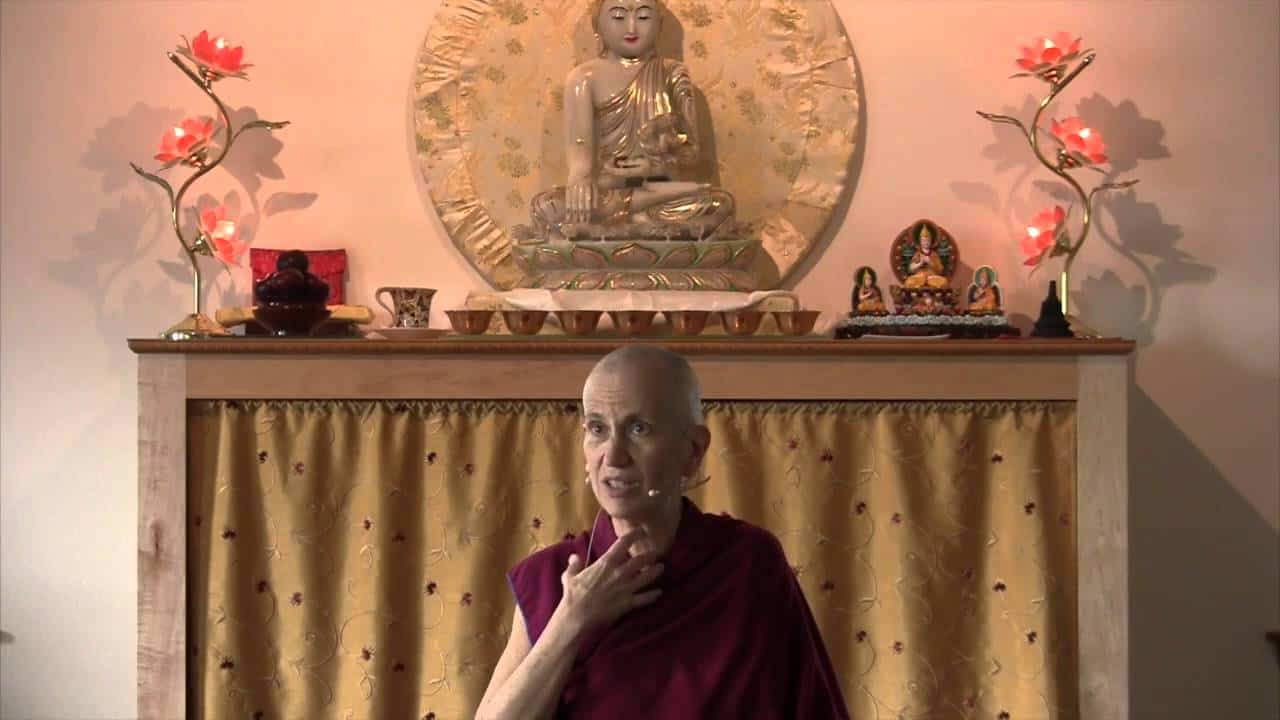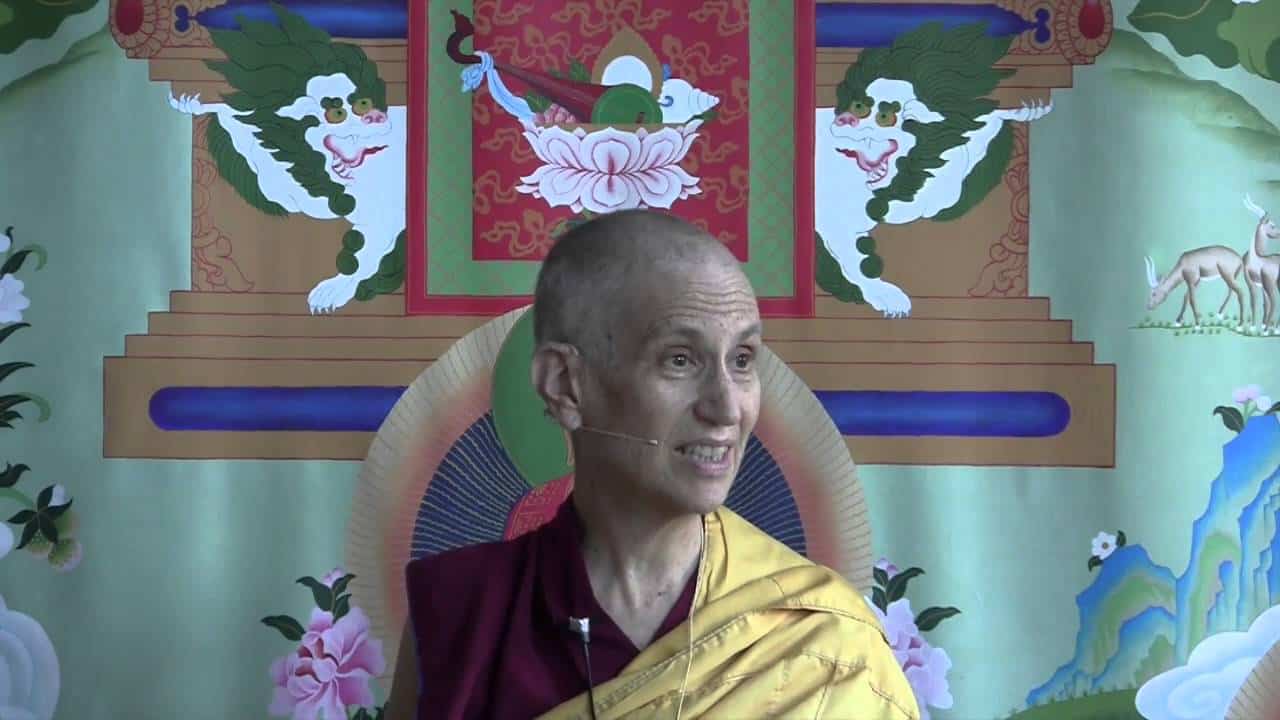Repaying kindness, love, and compassion
Part of a series of teachings on a set of verses from the text Wisdom of the Kadam Masters.
- Thinking about how all parents take care of their young
- The automatic wish to repay kindness
- The meaning of heartwarming love
- The importance of compassion
Wisdom of the Kadam Masters: Seven-point cause and effect, Part 2 (download)
To continue on with our way to develop bodhicitta, having considered that all sentient beings were our parents in previous lives and reflecting on their kindness. When you reflect on the kindness of your present-life parents, then you think all these other sentient beings who have also been my parents in past lives, have been kind in the same way. You’re not just stuck on your relationship with the parents of this life, but you’re generalizing it. You just use your parents of this life as an example. But also, you can look around in nature and see how parents take care of their young.
Some of you were at Cloud Mountain. Where any of you there the year when mama peacock had several eggs and they hatched? She was sitting on those eggs so diligently, with so much love, and then finally they hatched and she had these little baby peacocks all around. She would teach them how to peck so that they can get some food. I don’t think she needed to teach them how to squawk and disturb the meditators. They picked that up automatically. But they were so cute.
And it was very interesting, in the evening, to watch how she would collect them all together. And they’re all kind of walking around doing their own thing. And then she’d sit on them to keep them warm. And just to watch how she took such good care of them just naturally.
When I was at Kopan there was this dog named Sasha. I don’t know what happened to her back two legs, but she couldn’t walk on her back legs. Maybe she got hit by something. And she had wounds on her head with maggots growing on them. And she had a litter of puppies. And it was amazing to watch her in that kind of shape take care of her litter of puppies. She dragged herself around to go to the various kitchens and get whatever happened to be left over, and then nursed her puppies. So amazing.
I remember as a kid our kitty had kittens, and to watch how the mama cat took care of them.
Just to look around in nature, look around how you see people taking care of their young, and always relate it back and think, “They’ve taken care of me in that way too, when I’ve been born as an animal, when I’ve been born as a human being, always this kindness, protecting me, showing me how to do things, what I needed to learn in order to have a good life.”
They that that when we reflect on this deeply, and really feel ourselves to be the recipient of all of this kindness, then without effort a feeling of wanting to repay the kindness comes. That’s the third step.
And it makes sense, doesn’t it? When we really feel, and look around, like “Wow, I’ve received so much,” then it doesn’t take much to say, “I want to give back, I want to show love and affection and gratitude for all those beings who showed that to me.”
Again, the point is to remember this goes towards all sentient beings, not just towards the parents of this life. Because if we keep it just towards the parents of this life it can sometimes devolve into attachment and clinging, rather than the kind of love and gratitude that we really want to create in a Dharma sense. Very important to remember that it goes towards everybody.
In applying it towards everybody, of course it’s easier to think that your friends and the people you like have been your parents, but then to think that the spiders, and the gas station attendant, and all these different people—strangers or beings born in different realms–have been our parents. That’s a little bit more stretch.
And then the true thing…. You know what I’m going to say. I used to say George W., didn’t I? To think he used to be my mom. He’s been replaced, so they tell me. By D.T.. Who’s giving us the DTs. [laughter] That he’s been our mother, and has been kind—kind!—to us, and taught us how to be polite, and how to get along with other people. People are not some kind of concrete personality. There are not just two DTs. There are infinite beginningless lifetimes of them. You meet different beings, different “general ‘I’s” in different situations and have different relationships with them. So it’s important to generate like that.
From there the next step is what they call “heartwarming love”. Heartwarming love is slightly different than regular love. Regular love is wanting someone to have happiness and the causes of happiness. Heartwarming love is seeing them as lovable and wanting them to have happiness and the causes of happiness. It’s a kind of love that you need to cultivate to really see that somebody is lovable, or worthy of our affection. Affectionable. To really see that, that they’re worthy, they’re somebody worthy to wish well.
And to remember that love isn’t this thing that they sing about on the radio, with “I can’t live without you and I’m going to die if you’re not a part of my life….” Whereas everybody else is fine without that person. It’s not that kind. It’s a thing of really seeing people as worthy of love simply because they exist, and because at some time or another in our previous lifetimes they’ve been very, very kind to us.
That brings a feeling of a certain kind of closeness and familiarity. Normally when we see people it’s like this (arm’s length), especially strangers, especially the way the world is becoming now with everybody in this country armed to the teeth. It’s like (push away). The people who are armed are suspicious that everybody else is going to be a terrorist. And those of us who aren’t armed are suspicious that the people carrying guns thinking. Who knows what could set them off. Because you have people killing people… One guy shot somebody in a movie theater. Some guy… He and his wife were watching the movie at the theater. He texted or called home because his little girl was sick, to make sure she was okay. The guy in back of him said, “Turn off that text, turn off that phone and don’t do that.” He turned around, or stood up to talk to the guy, and the guy shot him. So those of us who don’t carry guns are afraid of all the people who do carry guns. I’m more afraid of them than I am of terrorists, to tell you the truth.
What I’m getting at is in our society where people are so suspicious, we don’t want to go through our whole lives being suspicious and guarded with other sentient beings. That’s no way to live. And the way I figure, if you’re going to get shot you might as well at least have a kind attitude towards the person. Because being suspicious is not… The attitude of suspicion doesn’t protect you from anything. It just makes you unhappy and miserable. If we can have a feeling of closeness with others it really cuts apart all this alienation, and everything is so globalized, and how do I fit in, and I don’t know anybody, and who are these people anyway…. And it really overcomes all this prejudice of putting people into narrow groups and saying we don’t want them in the country, or whatever, because we start to realize that everybody wants happiness like we do, everybody wants to be free of suffering as we do. There’s no difference. They’ve all been kind to us. They’re certainly worthy of having happiness and its causes. They’re worthy of our kind attitude towards them.I think this is especially important now. Don’t you? When you really think of what’s going on in society.
And then from love, which is the fourth of the seven points, then there’s compassion, which is equally important in our society now. Compassion being wanting someone to be suffering and the causes of suffering. Having that compassion, not wanting to inflict pain deliberately on others out of anger. Seeing that anger does no good in bringing about harmony in society. Anger does no good in terms even of getting what we want. Because we can bully people all we want, make them afraid of us, but that doesn’t bring about what we really want, which is close relationships. And people often confuse fear of somebody with respect for somebody. They think if somebody fears me that means they respect me. No, they’re totally different emotions. I think compassion, more than ever, in our world, with what’s happening, is really, really needed, and that everybody’s worthy of compassion.
And let’s face it, the Constitution said everybody’s created equal, but they’re only equal in one sense. We’ve already gone through this. If you’re a white Anglo-Saxon, Protestant, rich male who owns slaves, then you’re all equal. But everybody else doesn’t cut it. Aside from that, just the fact that everybody is equal in the sense of being a human being who’s worthy of respect, and to show that respect for everybody, but recognize that everybody is not born with the same opportunities.
So much of the situation we’re born in is dependent on previous karma. We are not born with equal opportunity. And so to have some compassion for those who are born with less opportunity than we have, and to have compassion for people who are born with more opportunity than we have but misuse their opportunity. Or have different problems because they have that opportunity. When you’re born the child of somebody who’s rich and famous you have a whole other different set of problems than somebody who’s born from very modest parents.
So to have a heart that sees that everybody faces challenges in samsara, and to wish that everybody be free of their misery and its causes. We really need this now. It’s not a nice philosophical idea to sit on our cushion and get blissed out about. It’s something that we really need to deal with this world. And to show an example, especially those of us here, for people who are wondering what is happening, and they need guidance, and they need a good example. So we have to provide that by working on our own minds. It’s not something you can do by faking it. You have to really have it.
Venerable Thubten Chodron
Venerable Chodron emphasizes the practical application of Buddha’s teachings in our daily lives and is especially skilled at explaining them in ways easily understood and practiced by Westerners. She is well known for her warm, humorous, and lucid teachings. She was ordained as a Buddhist nun in 1977 by Kyabje Ling Rinpoche in Dharamsala, India, and in 1986 she received bhikshuni (full) ordination in Taiwan. Read her full bio.


